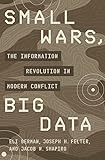Small Wars, Big Data : The Information Revolution in Modern Conflict / Eli Berman, Jacob N. Shapiro, Joseph H. Felter.
Material type: TextPublisher: Princeton, NJ : Princeton University Press, [2018]Copyright date: ©2018Description: 1 online resource (408 p.) : 19 b/w illus., 1 tablesContent type:
TextPublisher: Princeton, NJ : Princeton University Press, [2018]Copyright date: ©2018Description: 1 online resource (408 p.) : 19 b/w illus., 1 tablesContent type: - 9780691177076
- 9781400890118
- 355 23
- U240
- online - DeGruyter
- Issued also in print.
| Item type | Current library | Call number | URL | Status | Notes | Barcode | |
|---|---|---|---|---|---|---|---|
 eBook
eBook
|
Biblioteca "Angelicum" Pont. Univ. S.Tommaso d'Aquino Nuvola online | online - DeGruyter (Browse shelf(Opens below)) | Online access | Not for loan (Accesso limitato) | Accesso per gli utenti autorizzati / Access for authorized users | (dgr)9781400890118 |
Frontmatter -- Contents -- Preface -- Know the war you're in -- Esoc's motivation and approach -- Information - centric insurgency and counterinsurgency -- The information mechanism -- The role of development assistance -- The role of suppression -- How civilians respond to harm -- Economic conditions and insurgent violence -- What works? leveraging the information mechanism -- The enduring importance of understanding asymmetric conflict -- Notes -- Index
restricted access online access with authorization star
http://purl.org/coar/access_right/c_16ec
How a new understanding of warfare can help the military fight today's conflicts more effectivelyThe way wars are fought has changed starkly over the past sixty years. International military campaigns used to play out between large armies at central fronts. Today's conflicts find major powers facing rebel insurgencies that deploy elusive methods, from improvised explosives to terrorist attacks. Small Wars, Big Data presents a transformative understanding of these contemporary confrontations and how they should be fought. The authors show that a revolution in the study of conflict--enabled by vast data, rich qualitative evidence, and modern methods-yields new insights into terrorism, civil wars, and foreign interventions. Modern warfare is not about struggles over territory but over people; civilians-and the information they might choose to provide-can turn the tide at critical junctures.The authors draw practical lessons from the past two decades of conflict in locations ranging from Latin America and the Middle East to Central and Southeast Asia. Building an information-centric understanding of insurgencies, the authors examine the relationships between rebels, the government, and civilians. This approach serves as a springboard for exploring other aspects of modern conflict, including the suppression of rebel activity, the role of mobile communications networks, the links between aid and violence, and why conventional military methods might provide short-term success but undermine lasting peace. Ultimately the authors show how the stronger side can almost always win the villages, but why that does not guarantee winning the war. Small Wars, Big Data provides groundbreaking perspectives for how small wars can be better strategized and favorably won to the benefit of the local population.
Issued also in print.
Mode of access: Internet via World Wide Web.
In English.
Description based on online resource; title from PDF title page (publisher's Web site, viewed 27. Sep 2021)


